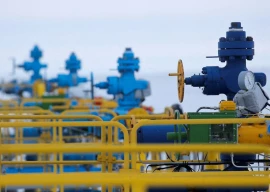
The State Bank of Pakistan (SBP) is expected to keep the discount rate unchanged for the fourth time in a row while no outside interference is expected following the resignation of the governor.
All eleven analysts polled by The Express Tribune on Thursday forecast that the central bank’s monetary policy committee will leave the discount rate unchanged at 14 per cent. The central bank’s acting governor Yaseen Anwar will announce the monetary policy statement on Saturday.
The discount rate, revised every two months, is the interest charged by the central bank when it lends to banks.
Regarding Kardar’s resignation, analysts said that the drawback is more political than economic. However, International Monetary Fund negotiations have been put in jeopardy,” said InvestCap Research Head Khurram Shehzad.
Shahid Kardar tendered his resignation earlier this month after developing serious “policy differences” with the government. The central bank is expected derive comfort from inflation remaining stable since February and sharp fall in government borrowing from SBP, analysts said.
The factors
Factors signalling the policy stance of monetary authorities have historically revolved around government borrowings trends from the central bank, treasury bill auction participation trends which indicate market expectations and inflation. The government continued to fulfill its commitment to keep SBP borrowing within limits, T-bill auction participation skewed towards longer terms of six and twelve months and a persistently inflation does not show any shift in policy stance.
The government borrowing from SBP fell by 1.4% on a yearly basis and a massive 18% from recent peak to Rs1,155 billion in June.
The Consumer Price Index, key indicator of inflation, stood at 13.92% in fiscal 2011, which was below SBP’s latest expectation of 14.5% and earlier expectation of 15-16%. Interestingly, inflation averaged 13.23% in the second half of the financial year compared with 14.6% recorded in the first half. Improved domestic agriculture yields and production are projected to keep food prices relatively lower compared with the regional markets.
Altogether, impact of the high base effect due to floods during the preceding fiscal year is expected to offset the impact of any subsidy elimination to some extent in the current fiscal year, said KASB Securities analyst Sarah Mazher. Therefore, average annual inflation is expected to settle at 12.2% in fiscal 2012.
Declining inflation should provide ample reason for gradual monetary easing from September onwards, subject to prudent fiscal management including higher revenue collection and resolution of fiscal deficit, added Mazher.
“Easing inflation gives room for a potential cut in the policy rate by 100 to 150 basis points during the second half of fiscal 2012,” said Mazher.
Published in The Express Tribune, July 29th, 2011.
COMMENTS (1)
Comments are moderated and generally will be posted if they are on-topic and not abusive.
For more information, please see our Comments FAQ

1731583017-0/diddy-(42)1731583017-0-165x106.webp)


1719315628-0/BeFunky-collage-(8)1719315628-0-165x106.webp)












This is a good article and analyses the situation well.
Inflation seems to have peaked but is still very high and REAL interest rates are barely positive.
No point in over-doing it with the IMF reference. Whatever they may feel about Mr Kardar's resignation, they deal with institutions, not individuals.
But it does upset them as it upsets all of us to have to deal with a new face everytime they come to Pakistan!